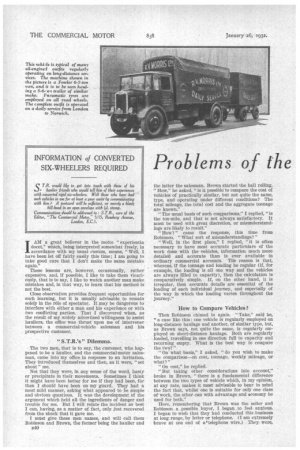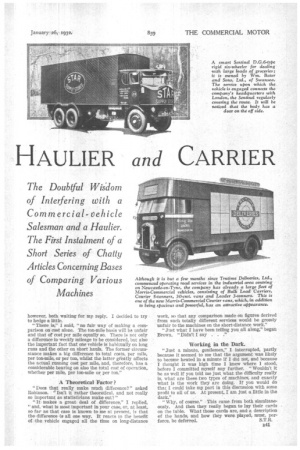Problems of the
Page 54

Page 55

If you've noticed an error in this article please click here to report it so we can fix it.
HAULIER and CARRIER IAM a great believer in the motto " experientia docet," which, being interpreted somewhat freely, in accordance with my usual custom, means, "Well, I have been let off fairly easily this time; I am going to take good care that I don't make the same mistake again."
These lessons are, however, occasionally, rather expensive, and, if possible, I like to take them vicariously, that is to say, I like to watch another man make mistakes and, in that way, to learn that his method is not the best.
Close observation provides frequent opportunities for such learning, but it is usually advisable to remain solely in the rffie of spectator. It may be dangerous to interfere with either a man and his experience or with two conflicting parties. That I discovered when, as the result of my widely advertised willingness to assist hauliers, the office was thrust upon me of intervener between a commercial-vehicle salesman and his prospective customer.
" S.T.R.'s" Dilemma.
The two men, that is to say, the customer, who happened to be a haulier, and the commercial-motor salesman, came into my office in response to an invitation. They introduced themselves and then, as it were, " set about" me.
Not that they were, in any sense of the word, hasty or precipitate in their movements. Sometimes I think it might have been better for me if they had been, for then I should have been on my guard. They had a most mild manner, asking what appeared to be simple and obvious questions. It was the development of the argument which held all the ingredients of danger and trouble for me. But I will relate the incident as best I can, having, as a matter of fact, only just recovered from the shock that it gave me.
I must give these men names, and will call them Robinson and Brown, the former being the haulier and B40 the latter the salesman. Brown started the ball rolling. "How," he asked, "is it possible to compare the cost of vehicles of practically similar, but not quite the same, type, and operating under different conditions? The total mileage, the total cost and the aggregate tonnage are known."
"The usual basis of such comparisons," I replied, "is the ton-mile, and that is not always satisfactory. It must be used with great discretion, or misunderstandings are likely to result."
" How? " came the response, this time from Robinson. "What sort of misunderstandings?"
"Well, in the first place," I replied, "it is often necessary to have most accurate particulars of the work done with the vehicles, information much more detaiieid and accurate than is ever available in ordinary commercial accounts. The reason is that, whereas, if the tonnage and loading be regular (if, for example, the loading is all one way and the vehicles are always filled to capacity), then the calculation is comparatively simple. If, on the other hand, it is irregular, then accurate details are essential of the loading of each individual journey, and especially, of the way in which the loading varies throughout the journey."
How to Compare Vehicles?
Then Robinson chimed in again. "Take," said he, "a case like this : one vehicle is regularly employed on long-distance haulage and another, of similar type, but, as Brown says, not quite the same, is regularly employed on short-distance haulage. Both are regularly loaded, travelling in one direction full to capacity and returning empty. What is the best way to compare the two?"
" On what basis," I asked, "do you wish to make the comparison—on cost, tonnage, weekly mileage, or what?"
"On cost," he replied.
" But taking other considerations into account," broke in Brown, "there is a fundamental difference between the two types of vehicle which, in my opinion, at any rate, makes it most advisable to bear in mind the fact that, whilst one is suitable for only one class of work, the other can with advantage and economy be used for both."
Here, remembering that Brown was the seller, and Robinson a .possible buyer, I began to feel anxious. I began to wish that they had conducted this business at long range, by letter or telephone. (I am extremely brave at one end of Otelephone wire.) They were, however, both. waiting for my reply. I decided to try to hedge a little.
"There is," I said, —no fair way of making a comparison on cost alone. The ton-mile basis will be unfair and that of cost per Mile equally so. There is not only a difference in weekly mileage to be Considered, but also the important fact that one vehicle is habitually on long rnns and the other on short hauls. The former circumstance makes a big difference to total costs, per mile, per ton-mile, or per ton,, whilst the latter greatly affects the actual running cost per mile, and, therefore, has a considerable bearing on also the total cost of operation, whether per mile, per ton-mileor per ton."
A Theoretical Factor ?
"Does, that really make much difference?" asked Robinson. 'r Isn't it rather theoretical, and not really so important as statisticians make out?"
"It makes a great deal. of difference," I replied, " and,•what is most important in your case, or, at least„ so far as that case is known to me at present, is that the difference -is all one way. It reacts to the benefit of. :the. vehicle engaged all the time on long-distance work, so that any comparison made on figures derived from such 'totally different services would be grossly unfair to the machines on the short-distance work."
"Just what I have been telling you all along," began Brown. "Didn't I say . . ."
Working in the Dark.
"Just a minute, gentlemen," I interrupted, partly because it seemed to me that the argument was likely to become heated in a minute if I did not, and because I thought it was high time I knew where I stood, before. I committed myself any further. "Wouldn't it be as well if you told me just what the difficulty really is, what are these two types of machines, and exactly what is the • work they are doing.• If you would do fie t I could take my part in this discussion with some profit to all of us. At present, I am. just a little in the dark,"
• "Why, of course." This came from both simultaneously. And. then they really began. to lay their cards on the table. What those cards are, and a description of the hands and how they were played, must,. per force, be deferred. S.T.R.






























































































